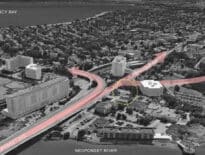
With the public health picture still unclear and new President Joe Biden’s efforts to speed up delivery of COVID-19 vaccines as yet embryonic, many small firms are reluctant to expand.
COVID-19 vaccines have started landing in the arms of Massachusetts’ first responders and nursing home residents. But for now, businesses remain cautious about expansion plans for 2021, changing the characters of some banks’ commercial loan portfolios and increasing their share of real estate loans.
The most recent Associated Industries of Massachusetts Business Confidence Index showed that while employers were gaining confidence in the Massachusetts economy, they had concerns about the national outlook.
“Massachusetts companies are optimistic about their own prospects, which provides hope that the economy will rebound once the nation gains control of the pandemic,” Raymond G. Torto, professor at the Harvard Graduate School of Design and chair of the AIM Board of Economic Advisors, said in a statement reporting the index’s December results. “But we are, as always, left with the uncertainty of an economic situation that is being driven by a public health crisis.”
A nationwide survey in December by the National Federation of Independent Businesses found that small business optimism had dropped, in part because of concerns about the new administration’s potential economic policies and the increased spread of COVID-19 causing renewed business closures.
The NFIB survey did find that 52 percent of business owners had reported capital outlays in the last six months, including expenditures on equipment, expanding facilities and purchasing land or buildings. And while 22 percent of owners planned capital outlays in the next few months, 60 percent of the small businesses surveyed were not looking for a loan.
Branches Offer Opportunity
Matthew Walsh, head of business banking for Chase Bank’s New England expansion, said his team has used the bank’s new locations as opportunities to reach out to local businesses and talk about Chase’s products, services and technology, winning interest from borrowers in the process. Chase began opening retail branches in Eastern Massachusetts two years ago and now has more than 20 locations.
Even as business banking becomes increasingly digital, Walsh said, business owners like to know that they have access to branches.
“We’re definitely having the conversation,” Walsh said. “We’re definitely looking to acquire business and grow market share, so we’re proactively speaking with a lot of potential prospects.”
The local companies seeking loans from Chase last year included those that have adapted their operations to the pandemic – technology, life sciences and medical businesses – and companies that see a pathway to growth, Walsh said. Other lending has been for short-term capital needs and real estate.
He added that economic uncertainty is keeping some businesses on the sidelines.
“They don’t necessarily want to leverage the company without having a good idea of what the forecast looks like for their revenue, for the [profit and loss statement], for the balance sheet,” Walsh said. “So, there is some hesitation toward looking for funding.”
Near–Record Year for Some
Lending opportunities were out there last year.
Hingham Institution for Savings reported a 12 percent increase in its loan portfolio in 2020, with growth concentrated in commercial real estate.
And Swansea-based BayCoast Bank in Southeastern Massachusetts had $340 million in new commercial loans, the second–highest volume the bank has had in any year. That’s in addition to $150 million in PPP loans.
“It’s sort of contrary to think that we would have had that brisk of activity on the conventional commercial side given the throes of COVID,” said Carl Taber, BayCoast’s executive vice president and chief lending officer. “January is starting off just as strong as December ended.”
While BayCoast has a diversified loan portfolio, Taber said last year saw more commercial real estate lending than commercial and industrial loans. Multifamily housing was a significant portion of the bank’s activity, Taber said, driven in part by strong rental markets in Southeastern Massachusetts, where cost of living is lower compared to Boston.
Some multifamily lending has been for new acquisitions, Taber said, while some experienced property owners have refinanced and held onto the cash, anticipating more deals as the year goes on. Other businesses seeking loans during the pandemic included construction companies as well as developers looking to purchase projects that had already gone through the permitting process.
Taber said that not all banks and areas of Massachusetts have had the same opportunities as BayCoast, and other banks have reached out to participate in loans. He added that banks looking to use some of the cash on hand have purchased some of BayCoast’s commercial loans to add to their liquidity.

Diane McLauglin
For businesses sitting on the sidelines, Taber has seen some of them restructuring debt and securing credit lines to get ready for an improving economy.
BayCoast has been able to add staff to the bank’s credit department and hire experienced commercial lenders, positioning it to continue to add to its loan portfolio. Taber said the ongoing low interest rate environment will likely continue to encourage lending.
“We’re cautiously optimistic that once the positive effects of the vaccine start to kick in, confidence will start to increase and people will be going out and businesses will be expanding and investors will be acquiring,” Taber said. “It should be a pretty good year, we hope.”






